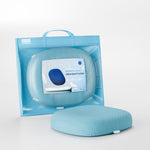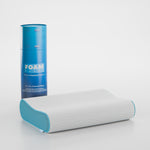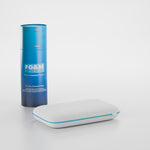How to Fall Asleep Quickly: 12 Ways to Overcome Insomnia

Neck and back pain, stress, depression, medications, jet lag... Falling asleep is sometimes extremely difficult, and we can experience sleep problems throughout the day.
In fact, some people suffer from insomnia disorder. Insomnia, also known as sleeplessness, is a disorder that makes it difficult to fall asleep and creates problems such as early awakening and sleep fragmentation.
So is there a way to fall asleep quickly? If falling asleep is difficult and you're struggling with sleep problems, take a look at our 12 ways to overcome insomnia disorder.
1. Create a Sleep Routine
One of the simple yet most effective solutions is definitely having a sleep routine. This way, the routine we repeat every night before bed can send a message to our brain that it's time to sleep. A warm shower or listening to a playlist... Whatever your personal care preference is, there's no harm in choosing it. Establish the most suitable routine for you and fall asleep faster.
2. Keep Your Room Cool
Our body is cooler during sleep. Having a hot room keeps your body warm too, and falling asleep can become even more difficult. Therefore, it's a good idea to set the room temperature to a maximum of 68°F (20°C).
3. Avoid Napping
Naps longer than 2 hours or taken in the evening hours reduce your sleep quality and delay the time it takes to fall asleep.
4. Get an Orthopedic Pillow
Another factor that may cause you to have trouble falling asleep could be neck pain and spinal curvatures. The best solution for this is definitely having an orthopedic pillow. This way, you can reduce your neck pain and fall asleep faster. FOAMSLEEP orthopedic pillows are specifically designed to provide optimal spinal alignment and support, helping you achieve the restorative sleep your body needs.
5. Pay Attention to Your Caffeine Consumption Times
Coffee is a wake-up tool we all love, but it's definitely one of the biggest obstacles to falling asleep. Still, you don't need to worry – you don't need to stop consuming coffee. Just drinking your last cup 6 hours before sleep will be sufficient.
6. Keep Your Feet Warm
When our feet get cold, our blood vessels constrict, sending a signal to the brain to stay awake. Make sure your feet are warm while sleeping.
7. Don't Look at the Clock
If you suffer from insomnia disorder, waking up in the middle of the night is probably a situation you experience frequently. Looking at the clock during such times will increase your stress about falling back asleep, so removing clocks from your room is an effective idea.
8. Get Sunlight
Spending time in sunlight during the day and spending time in a completely dark room at bedtime helps you adjust your biological sleep clock.
9. Play Relaxing Sounds
There are many studies showing that relaxing sounds increase the speed of falling asleep. You can also try falling asleep accompanied by rain sounds, instrumental music, or guided meditation.
10. Take a Warm Shower
Taking a warm shower before bed is both a good sleep routine and quite beneficial for your body's temperature regulation.
11. Turn Off Screens
Since the blue light emitted by phones prevents sleep, turning off your device while sleeping can help.
12. Take a Walk
Disclaimer: This information does not constitute medical advice. Please consult with a healthcare professional for proper diagnosis and treatment.




